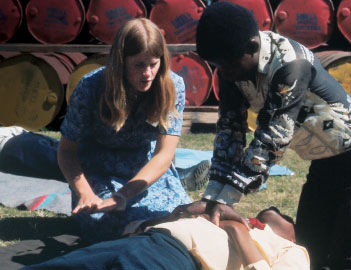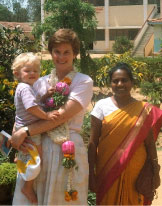
|
|
About Continuum Advertising Advisory Committee Archives Contact Us Continuum Home Faculty/Staff Subscribe related websites Alumni Association Marketing & Communications University of Utah Home |

ALUM PROFILE
Defending the Bill of RightsAs the new head of the ACLU of Utah, alumna Karen McCreary is working to create opportunities for peace and justice to prevail. by Linda Marion Gripping a coffee mug inscribed with the Bill of Rights, Karen Williams McCreary JD’84 explains that the script is supposed to disappear when the mug is filled with a hot liquid. A friend gave it to her, she says—perhaps to remind her that our rights disappear when too much heat is applied? Whatever the hidden meaning, the Bill of Rights serves as an appropriate symbol for McCreary, who was appointed head of the American Civil Liberties Union (ACLU) of Utah in November 2006. In a country that prides itself on serving as a beacon of freedom, equality, and human rights for the rest of the world, it would seem unnecessary to harbor a watchdog group that monitors the preservation of its citizens’ freedoms. But because humans are human and therefore flawed (to a greater or lesser extent), the ACLU exists to remind American citizens of the U.S. Constitution’s commitment to “freedom of speech, expression, and association; freedom of religion, including the separation of church and state; the right to privacy; safe prison and jail conditions; and equal protection and due process of our laws.” Every American would most likely agree that those rights are, as the Declaration of Independence states, “inalienable”—that is, undeniable and worth defending. But why, then, does the ACLU, whose mission is to preserve those rights, often get slammed? Why do some consider it a radical organization intent on contradicting the will of the people? Because, according to McCreary, “Even though we’re a democracy, which means that we vote and the majority rules, what we sometimes forget is that certain inalienable rights are guaranteed to all individuals, to balance the power of the state. And that can create tension.” Essentially, the ACLU works to defend persons or groups whose rights are in jeopardy of getting trampled by the majority. “We don’t go to bat for people saying something that everyone agrees with,” she explains. “We’re trying to defend the rights of people who are vulnerable—the rights of minorities, which can shift over time and place. I think [the ACLU] gets a bad rap when people don’t understand the principle,” she says. “People often focus on a particular case, rather than looking at the larger picture”—such as someone who wants the Ten Commandments posted in a public place, but protests when that “freedom” bumps up against the principle of the separation of church and state outlined in the Constitution. “What we forget with these hard cases,” she says, “is that these freedoms [noted in the Bill of Rights] are there to protect all of us, ultimately.” McCreary’s commitment to understanding and defending the principles found in the U.S. Constitution is a direct result of being exposed early on to other cultures, languages, and political systems.
She spent part of her childhood in India, speaking Hindi, where her father was posted with the United States Agency for International Development (USAID). As an adult, she had an opportunity to return there when her former husband, Bill McCreary, volunteered to serve as a chaplain at a hospital in Kolar, a village near Bangalore, which she had coincidentally visited as a child. Arriving with a 20-month-old baby in tow, the couple worked in the village hospital, nursery, and day care center, assisting people in the community with their parental responsibilities. McCreary describes some of her “character-building” experiences there: “We had electricity only a couple hours a day, and I washed diapers by hand—there was no such thing as disposable diapers then, and certainly no landfill for them. Monkeys frequently raided laundry from the clothesline,” she laughs, adding, “We got along fine but were exposed to the same situation locals had to live in.” Before that, in the early 1970s, McCreary had spent time in Malawi, in southern Africa, working for the American National Red Cross as part of its international relief and development program. Upon arrival in Malawi, a country of 13 million people that had only recently achieved independence from Great Britain, the Red Cross volunteers discovered that very little development had been carried out, which meant that basic services were almost nonexistent, including first aid. “I didn’t just want to be an ‘ugly American’ and really tried to be useful,” says McCreary, who had been trained in first aid in her home state of Colorado. She and other volunteers worked with the Malawi Red Cross, training instructors to teach first aid to others. During the Malawian celebration of independence, a series of events that went on for days, the Red Cross volunteers set up a first aid station inside the stadium where a soccer match between Malawi and another African country had attracted a large crowd. When the game was over, one of the stadium doors became jammed, and the throng inside began to push, shove, and then panic, creating a stampede. Many in the crowd were trampled or suffocated. “We did all we could to help resuscitate some of the victims,” says McCreary, “but in many cases we were too late. After that experience, I decided there really was something very useful I could do there.” She spent three months training firemen and nursing students, traveling around the country in a mobile clinic, and providing every kind of first aid. “It was a really great opportunity,” she says. At the end of her Malawi experience, McCreary, then age 20, traveled around Africa by herself—something not advisable to do today, she stresses—visiting Kenya, Liberia, and friends in Ghana and the Ivory Coast. McCreary’s international experience eventually nudged her toward pursuing a joint master’s program in international relations and law at the University of Denver. As a young adult, she had spent time in New Zealand on a work exchange, participated in peace and justice movements, served as a migrant worker advocate in Alabama, counseled at-risk youth, lived in Mexico, studied Spanish and Chinese, “and,” she says, “I just felt very global, very planetary.” Before completing the law part of the Denver program, however, she and her husband moved to Salt Lake City, where he had been offered a job as a Methodist minister. “I discovered that the U had a really good law school and decided to apply,” she says. McCreary was accepted into the program, graduated, took the bar exam when she was eight months pregnant, and started to clerk for U.S. District Judge David Winder when her son, David, was only four months old.
After clerking and then spending six months in India (with some side forays to Thailand and England), McCreary signed on with a Denver law office that had a branch in Salt Lake City. Then, in 1991, she landed back at the University of Utah, where she helped set up the Office of General Counsel, along with Vice President and General Counsel John Morris, also a professor of Law. “Karen was the second lawyer to join the Office of General Counsel,” says Morris. “She was here for more than 10 years and worked on many important issues during that time. We wish her great success in this new position.” McCreary later moved over to academic affairs to work with Senior Vice President David Pershing; she also taught courses on Higher Education Law in the Department of Educational Leadership and Policy. “Karen was extremely helpful with a whole range of legal and administrative issues, particularly in the areas of governance and faculty rights,” says Pershing. “We were very sorry to see her leave the University but understood that this [her appointment at the ACLU] was an exciting opportunity for her.” “I loved the U,” says McCreary. “It was a great place to be.” Located in downtown Salt Lake City, the headquarters of Utah’s ACLU is staffed by a small but dedicated group. A buzzer is required to enter the building, and there is no receptionist. McCreary even answers her own phone. In addition to simply getting oriented to her new surroundings, there’s a lot on McCreary’s plate right now. Currently on the ACLU’s docket is a case involving employment discrimination, in which a bus driver for the Utah Transit Authority was allegedly terminated after revealing she was transsexual. While there had been no complaints against her, she was fired because, according to her employer, UTA was unable to determine which restroom she should use. In addition to equality issues involving gender and race, the ACLU delves into protection of free speech, criminal justice, reproductive and voting rights, and religious liberty, among others. The newest category of civil liberties to be added to the list is “post 9/11 issues.” McCreary acknowledges that the national ACLU has been intricately involved in a number of cases relating to what it sees as civil liberties abuses in the wake of the 9/11 terrorist attacks. “Power loves to consolidate,” she says, “and we’re really seeing that right now with the abuse of power by the executive branch.” One of the hottest of the current hot-button issues is the Bush administration’s policies being implemented at Guantánamo Bay regarding “enemy combatants,” which the ACLU is challenging. “According to the administration, it has the sole power to determine who is an enemy combatant,” says McCreary, “as well as deciding that these people are not really people, in the sense that they have been denied habeas corpus, the most fundamental of citizens’ rights.” Habeas corpus, she explains, means “you have the body,” which allows a prisoner to challenge his being unlawfully detained—a tenet of human existence that has been around since the Magna Carta was issued in 1215 and that forms the basis of the U.S. Constitution. “This administration maintains that an enemy combatant, or, for that matter, a permanent legal resident in the U.S., can be held in prison for years without the right to an attorney or to know the charges brought against him,” says McCreary. In addition, “hundreds of people abroad have been caught up in extraordinary rendition, where suspected terrorists are picked up by the CIA and shipped off to Egypt or other countries where torture may be applied.” About these and other related issues, McCreary observes, “Leaders are prone to use fear to direct people where they want them to go.” In spite of, or perhaps because of, the challenges that lie ahead, McCreary acknowledges that she “jumped at the chance” when the opportunity to head the local ACLU came along. Referring to the 9/11 aftermath, she says, “It’s my country, and I love it, so who are these people, and why are they doing these things in my name? I want to do what I can to create opportunities for peace and justice to prevail, to live more hopefully.” “This is an opportunity I’m humbled by,” she adds. “I’m really grateful to work with others of good will.” She believes that “there are personal journeys we need to take in terms of our own development—to be more loving, more compassionate, and to learn to understand ourselves. As Americans, we need that self introspection—less bluster, less forcefulness. We can be strong, but strength doesn’t necessarily mean military power. If we’re going to have peace and security, we have to have justice, along with an appreciation of civil liberties. “We’re all in this together,” she says, “and this just happens to be the right place for me now.” —Linda Marion BFA’67 MFA’71 is managing editor of Continuum. |

